- Home
- Jim Eldridge
Murder at the Ritz
Murder at the Ritz Read online
MURDER AT
THE RITZ
JIM ELDRIDGE
Once again, for Lynne,
without whom there’d be nothing
CONTENTS
TITLE PAGE
DEDICATION
CHAPTER ONE
CHAPTER TWO
CHAPTER THREE
CHAPTER FOUR
CHAPTER FIVE
CHAPTER SIX
CHAPTER SEVEN
CHAPTER EIGHT
CHAPTER NINE
CHAPTER TEN
CHAPTER ELEVEN
CHAPTER TWELVE
CHAPTER THIRTEEN
CHAPTER FOURTEEN
CHAPTER FIFTEEN
CHAPTER SIXTEEN
CHAPTER SEVENTEEN
CHAPTER EIGHTEEN
CHAPTER NINETEEN
CHAPTER TWENTY
CHAPTER TWENTY-ONE
CHAPTER TWENTY-TWO
CHAPTER TWENTY-THREE
CHAPTER TWENTY-FOUR
CHAPTER TWENTY-FIVE
CHAPTER TWENTY-SIX
CHAPTER TWENTY-SEVEN
CHAPTER TWENTY-EIGHT
CHAPTER TWENTY-NINE
CHAPTER THIRTY
CHAPTER THIRTY-ONE
CHAPTER THIRTY-TWO
CHAPTER THIRTY-THREE
CHAPTER THIRTY-FOUR
CHAPTER THIRTY-FIVE
CHAPTER THIRTY-SIX
CHAPTER THIRTY-SEVEN
CHAPTER THIRTY-EIGHT
CHAPTER THIRTY-NINE
CHAPTER FORTY
CHAPTER FORTY-ONE
CHAPTER FORTY-TWO
CHAPTER FORTY-THREE
CHAPTER FORTY-FOUR
ACKNOWLEDGEMENTS
ABOUT THE AUTHOR
BY JIM ELDRIDGE
COPYRIGHT
CHAPTER ONE
Tuesday 20th August 1940, London. 7.30 a.m.
The Hon. Edgar Walter Septimus Saxe-Coburg – better known to his colleagues at Scotland Yard as Detective Chief Inspector Coburg – pulled up in his Bentley outside the small terraced house of his sergeant, Ted Lampson, in Purchese Street, Somers Town. Lampson, a stocky, muscular man in his early thirties with a boxer’s face, a bent nose and one ear flattened, was standing on the pavement with his ten-year-old son, Terry. The boy was looking up beyond the silver barrage balloons that hung in the sky over London, tethered to the ground by their steel cables, staring at the air battle going on in the sky as two Spitfires attacked a German bomber.
Lampson hurried over to the car, a concerned look on his face.
‘What’s up, guv’nor?’ he asked. ‘I was just leaving to get the bus to the Yard.’
‘Which is why I called,’ said Coburg, getting out of the car. ‘Change of plan. We’ve got to go to the Ritz.’
Coburg was in his early forties, taller than his sergeant and dressed with more elegance – the sign of a good tailor. A streak of white ran from front to back at one side of his thick dark hair, the result of an old war wound.
Lampson’s face lit up into a smile. ‘For breakfast?’
‘You’ll be lucky,’ said Coburg. ‘You ought to get a phone put in, then I could have called you.’
‘Can’t afford one, guv,’ said Lampson. He turned towards his son and shouted, ‘You got your gas mask, Terry?’
Terry opened his jacket to show the gas mask in its holder dangling from around his neck.
Coburg gestured towards Terry, his turn now to look concerned. ‘You sure he should be standing there?’ he asked. ‘He should be at the shelter.’
‘I was just making sure he went,’ said Lampson.
‘Not well enough,’ commented Coburg.
‘That’s a Dornier!’ shouted Terry excitedly. ‘A Do 17. It carries over 2,000 pounds of bombs.’
As they looked up, one of the Spitfires let burst a tracer of bullets that ripped into one of the German bomber’s two engines, which suddenly poured smoke, first grey then black, and flames could be seen licking at the plane’s wing.
‘It’s going down!’ yelled Terry delightedly.
‘For God’s sake, get in the car!’ barked Coburg, pulling open the rear door.
As Lampson pushed his son into the rear of the car, Coburg asked: ‘Where’s the nearest shelter?’
A woman had appeared from the house next door.
‘What’s going on?’ she demanded. ‘What’s that posh car doing outside my house?’
‘It’s an air raid, Mrs Smith,’ said Lampson. ‘Didn’t you hear the sirens?’
Mrs Smith looked at them, uncomprehending, then announced: ‘I haven’t got my hearing aid.’
With that she started to return to the house, but Coburg stopped her and steered her back towards the car.
‘It’s an air raid!’ he shouted.
He ushered her into the rear of the car next to Terry, pushed the door shut and slid behind the steering wheel, as Lampson got into the passenger seat.
‘Where’s the nearest shelter?’ Coburg asked again.
‘Maples depository, Pancras Road,’ said Lampson. ‘Just round the corner.’
Coburg looked out of his window and saw the German bomber, now engulfed in flames, hurtling down towards the ground.
‘It’s going to hit somewhere over the Caledonian Road,’ said Lampson.
‘If it’s still got its bomb load on it’s going to make a hell of a hole when it does,’ said Coburg. ‘I’m not taking a chance on another coming down before we get you to the shelter.’
He accelerated, taking care not to run into the pedestrians who were heading for the shelter on foot.
‘I’ve never bin in a Bentley before,’ said Terry. ‘You must have a lot of money, Mr Coburg.’
‘Don’t be cheeky, Terry,’ his father snapped at him.
‘I shouldn’t have left my hearing aid behind,’ said Mrs Smith. ‘I won’t be able to cope without it.’
‘I’ll look after you, Mrs Smith,’ Terry shouted to her.
Coburg pulled the car to a halt outside Maples large furniture depository, whose basement was doubling as an air-raid shelter. People were still hurrying in, guided by uniformed air raid wardens.
‘Get in there quick!’ said Lampson. ‘And look out for your gran and grandad! They’ll be looking after you.’
Terry opened the door and slid out of the car, then helped Mrs Smith out. Coburg waited until he was sure the pair had entered the depository before setting off again.
‘You should have sent Terry away like the other evacuees,’ said Coburg.
‘I did,’ said Lampson. ‘He went off with all the others, his name on a brown cardboard label pinned to his coat, but I brought him back two months later. The place he was staying in was rotten. The people treated him cruel, like an unpaid slave. I wasn’t having that.’
‘It’s still dangerous him being in London,’ insisted Coburg. ‘Haven’t you got family somewhere outside London you can send him to?’
‘No,’ said Lampson. ‘We’re all Londoners. I’ve got an uncle and aunt in Ramsgate, but they’re too old to handle Terry. I’ve also got a cousin in Kent, but as he lives near Biggin Hill that’s not a good idea at the moment.’
True, thought Coburg. The airfields of Kent were being bombed on a regular basis. It was a rarity that a German plane came as far as London, as that one had this morning. All the intelligence suggested that Hitler’s orders were to put the airfields out of action and destroy the RAF so that he could invade from the sea. Perhaps the pilot overshot his target.
‘I was thinking of joining the Local Defence Volunteers,’ said Lampson.
‘It’s called the Home Guard now, Ted,’ said Coburg. ‘Churchill renamed it. Anyway, I’d have thought you had enough to do already. You’ve got your job, and also your son to t
ake care of.’
‘My mum and dad keep a good eye on Terry,’ said Lampson. ‘They do it during the day.’
‘Which is why he needs you when you’re not at work.’
‘Other blokes do it,’ countered Lampson.
‘Most of them are retired people. Former soldiers with time on their hands.’
‘Not all,’ said Lampson. ‘My neighbour was talking to me about the Somers Town Home Guard. He’s a plumber and he’s in it, and he’s married with five kids. He goes to all the sessions, the practices and meetings and that.’
‘With five kids he’s possibly glad to get out of the house,’ commented Coburg.
‘Yeh, but I feel I ought to be doing something for the war effort,’ said Lampson. ‘I tried to join up but they wouldn’t take me because of the fact that my wife had died, so I was Terry’s only parent.’
‘Those are the rules,’ said Coburg. ‘And quite right, in my opinion. Every child should have at least one parent living. What would it do for Terry if you went off in the army and got yourself killed?’
‘You can get killed here,’ insisted Lampson. ‘Fire-watching. I know of two blokes who became volunteer firemen and were killed when the building collapsed on them.’ He looked accusingly at Coburg as he added: ‘And I don’t know why you’re so against me serving, guv. You volunteered in the last lot.’
‘I did. And I got shot.’ Then he added, in a more conciliatory tone: ‘Not that that would have stopped me. The difference was that I wasn’t married, I had no children depending on me. We’re all doing our bit in different ways. Like now, we’ve got a dead body to take care of.’
‘It’s not the same, though, is it? If the Germans invade, we need men to stop them. And not just on the beaches, but in towns and cities. They reckon they’ll come down by parachute in their thousands.’
‘Yes, I agree, I think that’s likely,’ said Coburg. ‘And if it happens, I’ll be there too, with a gun and whatever else is to hand to defend us. At the moment, my faith is in the RAF blowing German bombers out of the sky and shooting down their fighter planes. So long as those boys can keep the Luftwaffe at bay, I believe Hitler will hold his invasion fleet back.’
‘His fleet’s all ready around Calais,’ said Lampson. ‘Hundreds of ships and thousands of soldiers. My uncle in Ramsgate says you can see ’em through a telescope.’
Coburg shook his head. ‘It’s twenty-five miles of choppy sea across the Channel, at risk from attacks by the air and our navy when they get close to the Kent coast. The Germans are methodical. I know, I fought them for nearly a year in the first lot. They don’t rush in unless they’re sure of victory. Hitler will put everything into trying to destroy the RAF, as he’s doing now, before he unleashes his invasion fleet.’ He gestured upwards with one hand. ‘Those are the guys who need our support. The ones in their Hurricanes and Spitfires riding shotgun on our behalf. At the moment they’re our first – and only – line of defence.’
CHAPTER TWO
Coburg led the way as he and Lampson passed through the main doors into the luxurious marble-floor foyer of the Ritz Hotel, then made for the long, curving glass-topped desk to the right. George Criticos, the hall porter, stood there resplendent in his dark blue frock coat adorned at the collar and cuffs with gold braid, the living embodiment of the elegance that was the Ritz from his pomaded dark hair down to his highly polished patent leather shoes.
‘Mr Edgar!’ greeted George with a broad smile. ‘Good to see you again!’
‘Good morning, George,’ said Coburg, shaking the man’s hand. ‘This is my Sergeant, Ted Lampson.’
‘Mr Lampson. A pleasure. Any colleague of Mr Edgar’s is very welcome here.’
‘Did our uniformed officer arrive? I phoned the local station to ask them to send someone.’
‘He did indeed. A constable. He’s guarding the door of the suite where the body was found.’
‘Has the doctor been?’
‘He’s upstairs, examining the body. Dr Matthews.’
Thank God for that, thought Coburg. Rob Matthews was very competent and easy to get on with, not like some of his colleagues. Dr Alexander Stewart was one of Coburg’s particular bête noires, an elderly Scot who seemed to have a loathing for all things that weren’t Edinburgh. Coburg had often wondered why Dr Stewart didn’t return to his favourite city if he detested everywhere else so much, but when he’d made discreet enquiries he discovered that the people of Edinburgh, at least the medical authorities, considered Stewart to be an arrogant and bullying pain in the rectum. He’d left the city in high dudgeon in protest at what he considered their insolent attitude towards him and decided to inflict himself on London.
‘In whose suite was the body found?’
‘One of the suites belonging to King Zog of Albania and his party.’
‘One of the suites?’ queried Coburg.
‘The royal family has taken over the whole of the third floor,’ explained George. ‘They are a large party. As well as King Zog and his wife, Queen Géraldine, and their baby son, Prince Leka, there are the King’s six sisters, three nephews and two nieces, along with a twenty-strong retinue of advisers, courtiers and bodyguards.’
‘In whose actual suite was the body found?’
‘One of the courtiers. He isn’t there at the moment, nor, so I’m told, was he there during the incident. It was one of the maids who discovered the body when she went in to clean. She found a man who’d had his throat cut lying on the floor, and her screams brought some of the hotel staff.’
‘Does anyone know who the dead man was?’
George shook his head. ‘Everyone claims they have no idea who he is, or what he was doing in the suite. The manager ordered everything to be left as it was until the police arrived. He asked for you particularly.’ Then he added, in low tones: ‘He will be most grateful if the body can be removed as soon as possible. It seems the carpet will need to be replaced, and that needs to be arranged as a matter of urgency.’
‘Thank you, George. We’ll see what we can do to speed things up.’
As Coburg and Lampson headed for the lift, the sergeant grumbled: ‘Replace a carpet! Why don’t they just clean it?’
‘This is the Ritz, Ted. Make do and mend isn’t for them or their clientele. They expect only the best, and they’re prepared to pay for it.’
‘Huh! How the other half live!’ Lampson commented sourly.
The uniformed constable on guard outside the suite saluted as Coburg and Lampson approached, and handed the key to the chief inspector.
‘No one’s tried to come in, sir,’ he told them.
‘Thank you, Constable,’ said Coburg.
They let themselves into the suite, which was the epitome of opulence. The only jarring note to the otherwise perfect decor was the body of a young man, dressed in what appeared to be an elegant dark suit, sprawled on his back on the carpeted floor, one arm flung out. He was of medium height, thin, deathly pale, clean-shaven, his longish dark brown hair curling just over his ears. Dr Rob Matthews, a man in his early thirties was kneeling beside the body and looked up at Coburg and Lampson.
‘Bit of a messy one,’ he commented.
The carpet area around the dead man’s neck and shoulders bore a large bloodstain, with more splashes visible all around.
‘That’s quite a spread,’ said Coburg. ‘Must’ve hit an artery.’ He turned to Lampson and asked: ‘Still think it can be easily cleaned?’
‘No,’ Lampson admitted. ‘It’ll always be seen. Maybe next time they’ll put down a carpet that’s better suited. A crimson one.’
Dr Matthews got to his feet. ‘Well, there’s not much more for me to do here,’ he said, putting his equipment into his case. ‘I’ve arranged for him to be taken to University College Hospital, so can I leave you to phone them to send an ambulance for him when you’ve finished?’
‘No problem,’ said Coburg. ‘Time of death?’
‘From the blood clots, the state of rigor, I�
�d think some time during the early hours of this morning. I’ll know more when I get him to the morgue. Just to let you know, I won’t be starting work on him until later this afternoon. I’ve got a busy schedule of patients to deal with today, living ones who I hope to keep in that condition.’ He headed for the door with a wave of farewell. ‘I’ll leave this one to you.’
Once the doctor had left, Coburg stood examining the scene, particularly the large bloodstain.
‘Four different sets of footprints,’ he said. ‘Two types of boots, two of shoes. Assuming one is the doctor’s and the maid didn’t come this far, that means three men were involved.’
He moved nearer to the body, to the side away from the area of blood, knelt down and began to examine the dead man, while Lampson took out a notepad and pencil ready to jot down any salient facts his boss spotted.
‘Age: mid-twenties, is my guess,’ said Coburg. He turned back the lapel of the man’s jacket. ‘Burman’s,’ he said. ‘Theatrical tailors.’ He looked at the man’s shoes. ‘The shoes don’t match the suit. That’s smart and cut to perfection. His shoes are clean, but look at the soles. They’ve been re-soled and look like it needs to be done again.’
‘So, dressed up to look like money, but piss-poor.’
Coburg went through the man’s pockets looking for a wallet or some form of identification.
‘Nothing to show who he was.’
‘Reckon someone took his wallet? A robbery?’
‘Judging by the fact his shoes needed repairing, I doubt if there was much money in it. No, it was taken to stop us finding out who he is.’ He bent down and studied the man’s face, gently running a fingertip around his ears and eyes before putting his finger to his nose.
‘Traces of make-up around his eyes and ears.’
‘An actor of some kind?’ suggested Lampson. ‘That would fit with the suit being from a theatrical tailor.’
‘Possibly,’ said Coburg. ‘Or it could have something to do with the Pink Sink.’
‘What’s the Pink Sink?’ asked Lampson.
‘It’s a club for homosexuals in the Ritz’s basement,’ said Coburg.
Lampson looked discomfited. ‘And the hotel allows it?’ he asked, indignantly. ‘It’s against the law!’

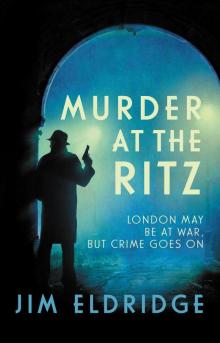 Murder at the Ritz
Murder at the Ritz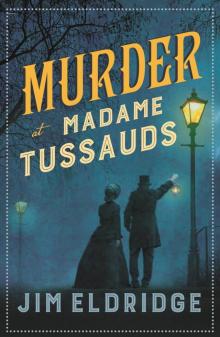 Murder at Madame Tussauds
Murder at Madame Tussauds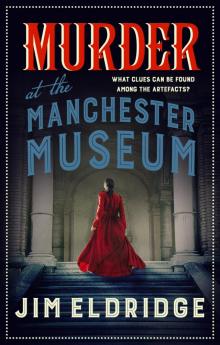 Murder at the Manchester Museum
Murder at the Manchester Museum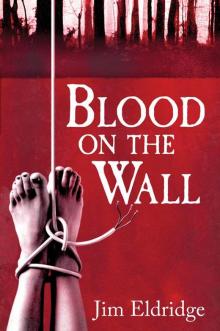 Blood On the Wall
Blood On the Wall 4.3.2.1
4.3.2.1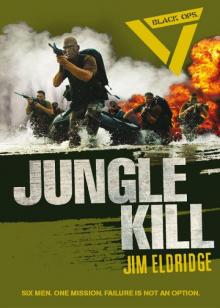 Jungle Kill (Black Ops)
Jungle Kill (Black Ops)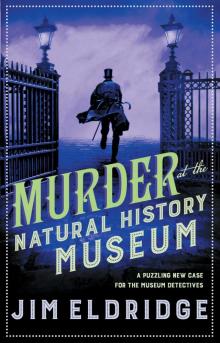 Murder at the Natural History Museum
Murder at the Natural History Museum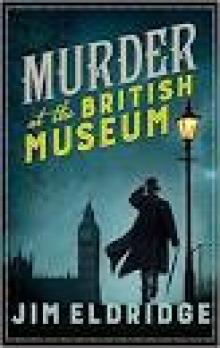 Murder at the British Museum
Murder at the British Museum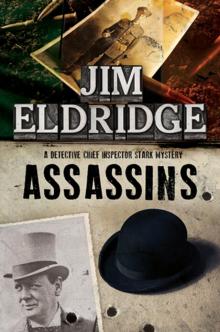 Assassins
Assassins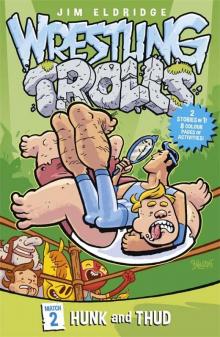 Hunk and Thud
Hunk and Thud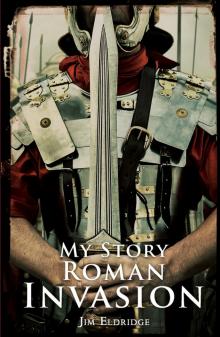 Roman Invasion
Roman Invasion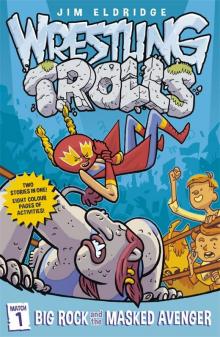 Big Rock and the Masked Avenger
Big Rock and the Masked Avenger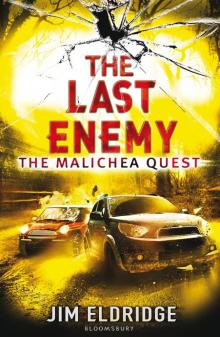 The Last Enemy
The Last Enemy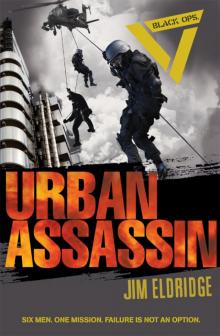 Urban Assassin
Urban Assassin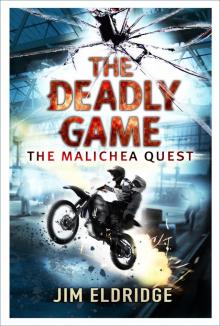 The Deadly Game
The Deadly Game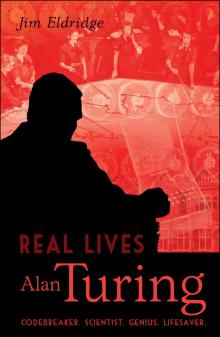 Alan Turing
Alan Turing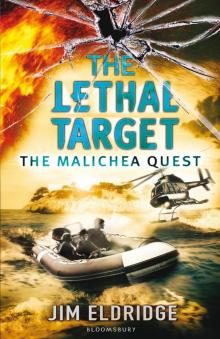 The Lethal Target
The Lethal Target The Giant Rumble
The Giant Rumble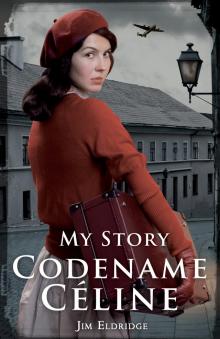 Codename Céline
Codename Céline Death in the Desert
Death in the Desert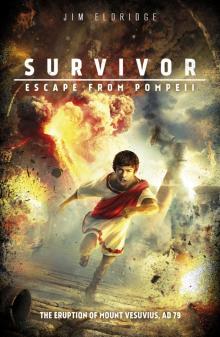 Escape from Pompeii
Escape from Pompeii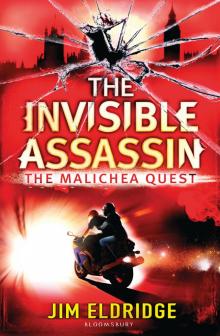 The Invisible Assassin
The Invisible Assassin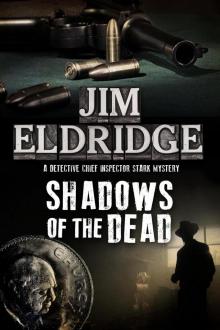 Shadows of the Dead
Shadows of the Dead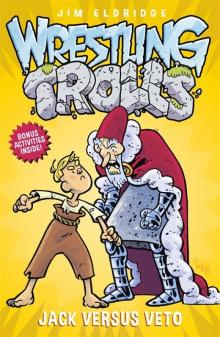 Jack Versus Veto
Jack Versus Veto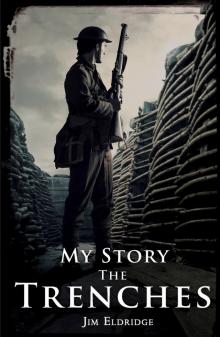 The Trenches
The Trenches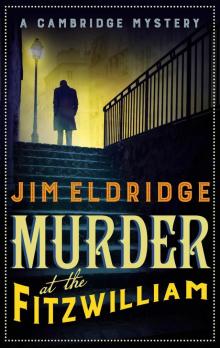 Murder at the Fitzwilliam
Murder at the Fitzwilliam Coming Home
Coming Home